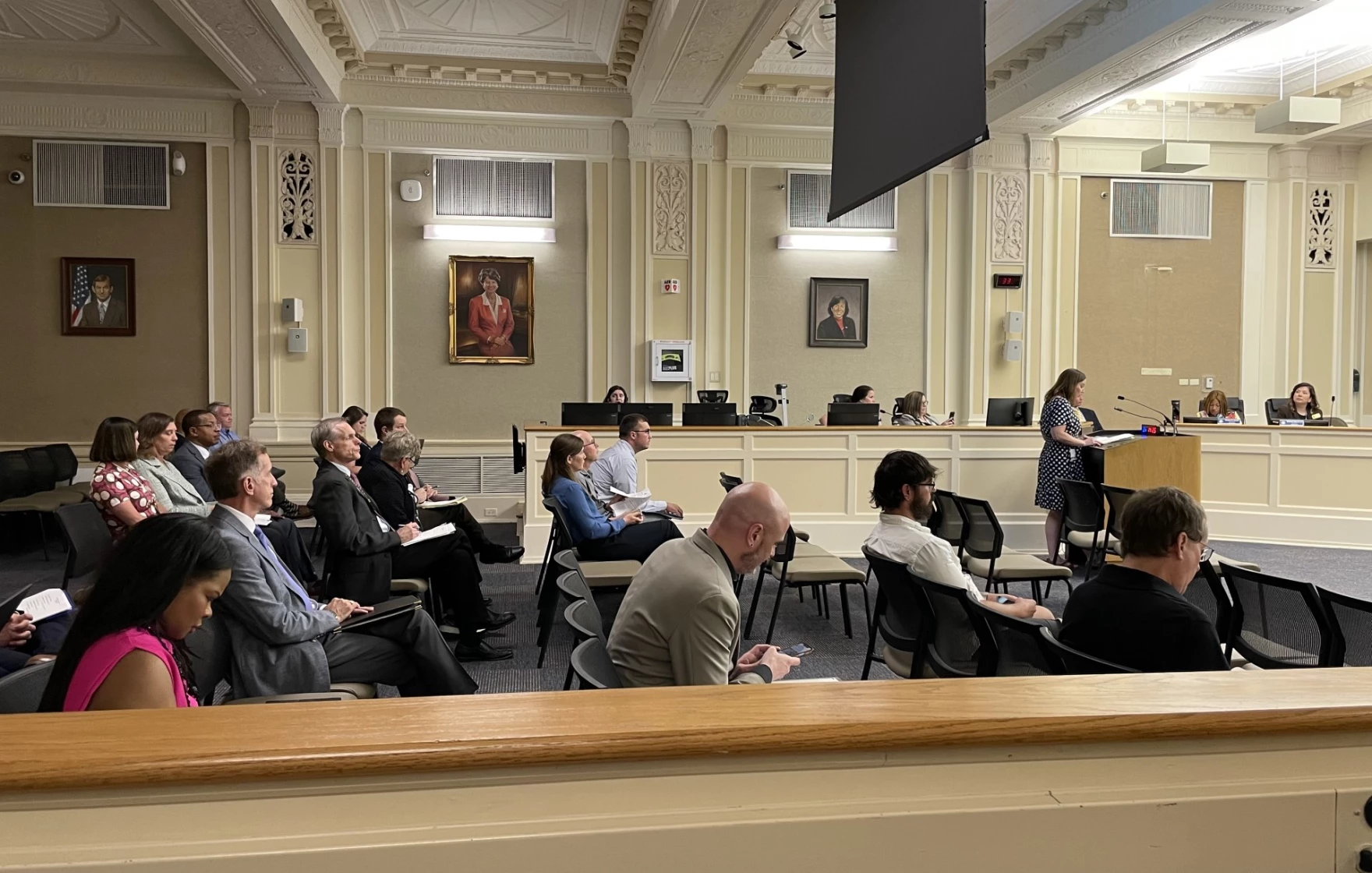Taxes near the top of priority list as Lexington City Council returns

WEKU | By Stu Johnson
There are certain aspects of the fall season that are seen each year. In addition to cooling temperatures and falling leaves, there’s a given when it comes to taxes in the Lexington community. Fall property tax bills will be going out in a few weeks. The first step in that process occurred this week at City Hall.
The Lexington City Council Chamber was buzzing again this week, following about a monthlong recess.
The first Council meeting back after summer break traditionally includes a talk on taxes.
“Good Afternoon, Welcome back. You get to talk about property taxes,” said Lueker.
Lexington City Budget Director Melissa Lueker gave the 15 Council members options for property tax rates and then votes were taken on five different levies.
Funds generated through property taxes comprise a relatively small portion of funding for urban county government. That number is about $30 million or 15% of total tax revenues. The largest driver is the payroll tax at $260 million. Over the years, officials have thought about shifting that tax makeup to include more property tax support and a smaller payroll tax. Long-time Council Member Chuck Ellinger said payroll reliance has worked well most years.
“Well, we’ve always looked at trying to not be so dependent on our payroll tax and our net profit..We’re fortunate that we have our education and our health care in our community, so I won’t say we’re recession proof, but we certainly has that which helps,” said Ellinger.
Ellinger is referring to big employers like the University of Kentucky, Transylvania, Fayette schools, along with three sizeable healthcare entities in the area.
Lexington mayor Linda Gorton said the “Rethink Lexington” initiative a few years back, which focused on how to make government more efficient, included taxation suggestions.
“There’s a lot of burden on working people right now but then when you talk property tax you’re talking about a lot of people who are seniors, who are retired, who are on fixed incomes, so it’s a real delicate balance,” said Gorton
Gorton said COVID-19 came along and ReThink suggestions were put on hold.
The Kentucky League of Cities has, for decades, asked the state legislature to give local governments more flexibility on taxation through a constitutional amendment. Most often that has involved talk of allowing cities to impose a local sales tax. Mayor Gorton likes that option, but only for a specific amount of time.
“If they had a specific project…now I’m just gonna use this as an example..a new city hall…Lexington’s a city I think that would vote to have a temporary sales tax put on to build a city hall and then it would sunset,” said Gorton
Gorton said that could mean lowering another tax while the local sales tax is in effect.

Small bowls of food were being rolled out on a cart this week to visitors at Lexington’s Senior Center. 83-year-old Lexington native and retired minister John Williams has mixed feelings about what’s the best mix of taxes.
“You know, it’s kind of a complicated… it’s not something that’s just as simple as switching money from here to there..there’s complications both ways,” said Williams
In addition to putting a heavier tax burden on retirees, Williams says a higher property tax would hit renters through increased rent. And he says any change would need to be weighed against how it might impact the local economy.

Also eating lunch at the Senior Center was Susan Wolfe who also has mixed feelings.
“My house taxes have gone up which has also made my homeowners insurance go up….at the same time I think we all need to pay taxes,” said Wolfe.
Wolfe said the taxes are necessary for good roads and public safety and she wishes for better healthcare.
81-year-old Hershel Heisel said he contributed to the tax base through payroll levies for decades. He noted the current property taxation is a pain, but he can handle it.
Budget Director Lueker said property values in Lexington had increased 8% over the last year. Fayette County Property Valuation Administrator David O’Neill says it’s averaged 4.5% over the last decade. O’Neill admitted continuing this trend could cause household strain.
“We don’t like to see people’s taxes jumping up that significantly. You know if your property’s only reassessed once every four years, but values are going up eight percent a year then by the time we come back around to you, you could be getting a 40 to 50% increase in your tax bill and nobody wants that..nobody expects it…nobody’s prepared for it,” said O’Neil.
O’Neill said he believes the property values have risen partly because of a strong demand, but also a lack of supply in housing.
So, for now and the foreseeable future, Lexington citizens will be taxed under the same structure. Property tax bills should be arriving in mailboxes in the coming weeks.
WEKU is working hard to be a leading source for public service, fact-based journalism. Monthly sustaining donors are the top source of funding for this growing nonprofit news organization. Please join others in your community who support WEKU by making your donation
Top photo: Lexington Council Chamber During Tax Option Presentation 08-15-23 (Stu Johnson for WEKU)
Republished with permission.
Recommended Posts

Kamala Harris needs a VP candidate. Could a governor fit the bill?
Fri, July 26, 2024
After cyber-attack on Jefferson County Clerk, Fayette counterpart discusses precautions
Fri, July 26, 2024
An eastern Kentucky animal shelter is swelling this summer
Fri, July 26, 2024